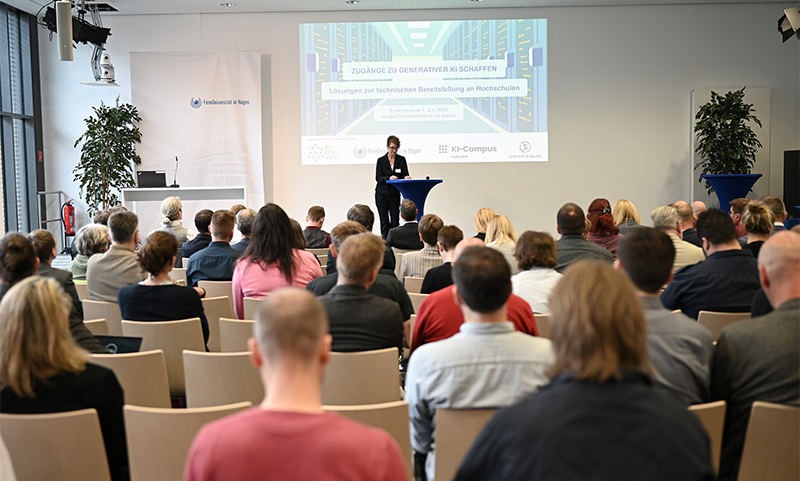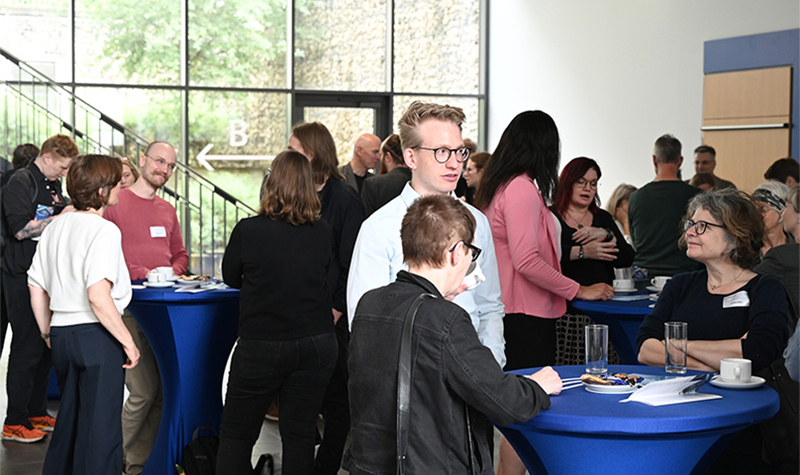News
Symposium on generative AI at universities
[04.07.2024]Creating access to generative AI: On the campus of the FernUniversität in Hagen, experts from universities across Germany discussed technical solutions for the provision of AI. CATALPA executive board member Prof. Dr. Claudia de Witt was instrumental in initiating the event.
 Photo: FernUniversität
Photo: FernUniversität
The symposium was organized by KI-Campus-Hub NRW, the project KI:edu.nrw and Stifterverband e.V. "Generative AI offers great opportunities for universities. But the technical implementation - data protection-compliant and ethically justifiable - still presents us with major challenges," explained Prof. Dr. Claudia de Witt, Chair of Educational Theory and Media Education at FernUni and Head of the AI Campus Hub NRW at the opening of the event. Prof. Dr. Stefan Stürmer, Vice-President of the host FernUniversität in Hagen, added that the disruptive nature of generative AI will bring significant changes, particularly in teaching and examinations. Many financing issues are also still unresolved.
What is possible and what is desirable?
In their opening impulse on the provision of generative AI at universities, Dr. Peter Salden, Jonas Leschke and PD Dr. Malte Persike from KI:edu.nrw identified four target complexes:
- Costs: Reduction of development, operating and support costs for
the universities
- Scalability: Fast and efficient expansion of the user base and IT architecture
- Options: Choice between several AI systems and user interfaces
- Flexibility: Modular structure for flexible integration into the university IT system
A coexistence of commercial systems such as ChatGPT and open source models is desirable, as both systems have different strengths. There are three very different open source approaches:
- development of own open-source AI models
- use of existing open-source AI with external hosting
- use and hosting of existing open-source AI
The use of open-source interfaces to commercial AI must be considered separately.
Provisioning paths and project insights
But what does it look like in practice? The symposium offered an insight into four very different examples:
-
Using commercial services such as ChatGPT or hosting an open source model yourself: many universities are faced with this decision. The FernUniversität in Hagen is exploring both options. Computational linguist Prof. Dr. Torsten Zesch and business data procession specialist Michael Hanses (both from CATALPA, Center of Advanced Technologies for Assisted Learning and Predictive Analytics at FernUni) presented the open source solution FLEXI - short for FernUni LLM Experimental Infrastructure. They presented live queries on various self-hosted open source models. "With FLEXI, we can successfully demonstrate that it is possible to operate generative AI at the university itself," emphasized Michael Hanses. "The living lab approach of our research center allows us to test FLEXI in real-world applications," explained Torsten Zesch. And not just technically: CATALPA accompanies various application scenarios with research projects. "So far, there is hardly any evidence on the impact of large language models on teaching," says Zesch.
-
The interaction designers at the Hildesheim University of Applied Sciences and Arts (HAWK) led by Prof. Dr. Stefan Wölwer decided early on to develop HAWKI , a free interface for the use of ChatGPT that is secure in terms of data protection. The interface is already being used at around 30 universities across Germany. Wölwer and his team are currently developing HAWKI further. The aim is to create an ecosystem for teaching and learning, examinations and administration into which open source LLMs, local IT systems and data management can also be integrated.
-
Chat AI offers an LLM service based on open source, with an AI chat without a storage history, free use of various open source models and the option to train large language models on demand, for example. The project presented by Jonathan Decker is part of the portfolio of the BMBF-funded AI Service Center for Sensitive and Critical Infrastructures (KISSKI). KISSKI is managed by the Georg-August-Universität Göttingen, project partner is the GWDG, Gesellschaft für wissenschaftliche Datenverarbeitung mbH Göttingen, which acts as IT provider for the university and the Max Planck Society. In future, the KISSKI services will be integrated into HAWKI so that universities can use both commercial and open source AI at the same time.
-
Making a chatbot accessible and didactically integrating the service with handouts and recommendations - this is what the Baden-Württemberg University Network for the Digitalization of Teaching (HND BW) has set out to do in collaboration with Aalen University. The bwGPT service presented by Dr. Matthias Bandtel and Markus von Staden is based on GPT4, made accessible via the HAWKI interface. bwGPT can be integrated into the learning management systems of the participating universities and pilot users. In addition, there is a comprehensive further training concept and support for Baden-Württemberg's universities in clarifying legal issues relating to digital teaching.
Guidance on data protection
Data protection is one of the key challenges for universities when providing generative AI. The guidance document Artificial Intelligence and Data Protection (PDF 1.1 MB, German) from the Conference of Independent Data Protection Supervisory Authorities of the Federal and State Governments offers support here. Uwe Hofmann, Data Protection Office of the FernUniversität in Hagen, presented the document at the symposium and gave his assessment.
 Photo gallery
Photo gallery
With synergies at the pulse of technology
The provision of generative AI will not work without cooperation and cross-university collaboration: This was the unanimous conclusion of the participants in the concluding panel discussion, moderated by Dr. Annabell Bils, Center for Learning and Innovation at FernUni. "Synergies play a very important role here," emphasized Mariele Ratter from the Ministry of Culture and Science of North Rhine-Westphalia (MKW NRW). PD Dr. Malte Persike, KI:edu.nrw, emphasized that this is also necessary due to the speed of technological development with ever new AI tools in the education sector. However, this also requires a change in organizational culture and a greater willingness on the part of universities to cooperate, which must also be desired and actively supported by university management, according to FernUni Vice-President Prof. Dr. Stefan Stürmer. Dr. Konrad Faber, Network of State Institutions for Digital Higher Education in Rhineland-Palatinate, emphasized that there is no reason to fear a standardization of the university landscape: "Universities can cooperate on a technical level and in didactics, for example - and still distinguish themselves in terms of content and subject matter."
"The issues we face are the same in all federal states," emphasized Dr. Peter Salden at the end of the event. This is why cross-state exchange is so important. Prof. Dr. Claudia de Witt concluded by once again emphasizing the importance of data protection: "This is the only way to create acceptance and trust. But if we succeed - then I am optimistic that we will attract many more teachers to AI for these technical and didactic innovations than before."
- AI Campus Hub NRW | more
- KI:edu.nrw (German) | more
- Stifterverband | more
- All presentation slides (German) | more
Text: Christina Lüdeke

